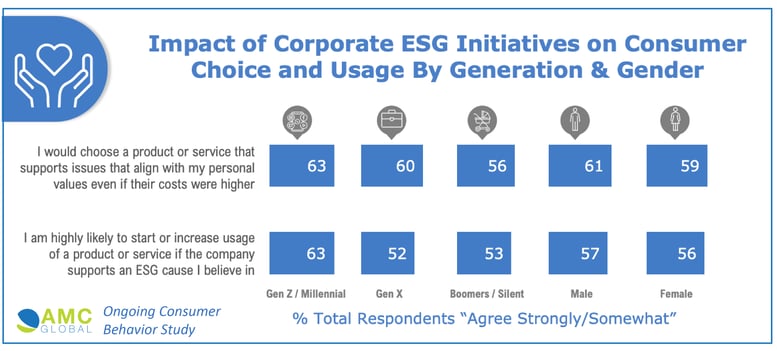Ongoing market research study shows corporate environmental, social and governance issues most impactful to Gen Z and Millennials
AMC Global and OpinionRoute have released the latest wave of their ongoing consumer behavior study. The new findings uncover how consumer attitudes differ by generation—and by gender—regarding corporate “Environmental, Social and Governance” (ESG) matters.
The study shows that Generation Z and Millennials select social issues as “most important” more than other generations, particularly in the area of mental health, serving underserved communities, animal welfare, DEI initiatives, and women’s reproductive rights.
The study also showed differences between genders, with women reporting a wide variety of social issues to be more important to them than men. That said, more men are likely to stop using a brand or product if it does not align with their personal values.
A complete representation of the “Generational and Gender Attitudes Toward Corporate ESG Matters” can be found here or by clicking the callout below.
Key findings from the latest study:
- When asked of each area of ESG, environmental and governance issues ranked similarly for each generation studied. However, social matters ranked “most important” for 38% of Gen Z & Millennials, followed by 31% of Gen X and 25% of Boomers.
- Across all generations and genders, the governance matter of “Protecting personal data with strong policies” was ranked most important—with Gen Z/Millennials at 68%, Gen Z at 77%, Boomers at 82%, men at 73%, women at 77%.
- Sixty-three percent of Gen Z and Millennials state they would “choose a product or service that supports issues that align with my personal values even if their costs were higher” and that they are “highly likely to start or increase usage of a product or service if the company supports an ESG cause” they believe in.
A complete representation of the “Generational and Gender Attitudes Toward Corporate ESG Matters” can be found here. Your company's ESG initiatives do have an impact on consumer behavior. Want to learn more? Reach out to us.





